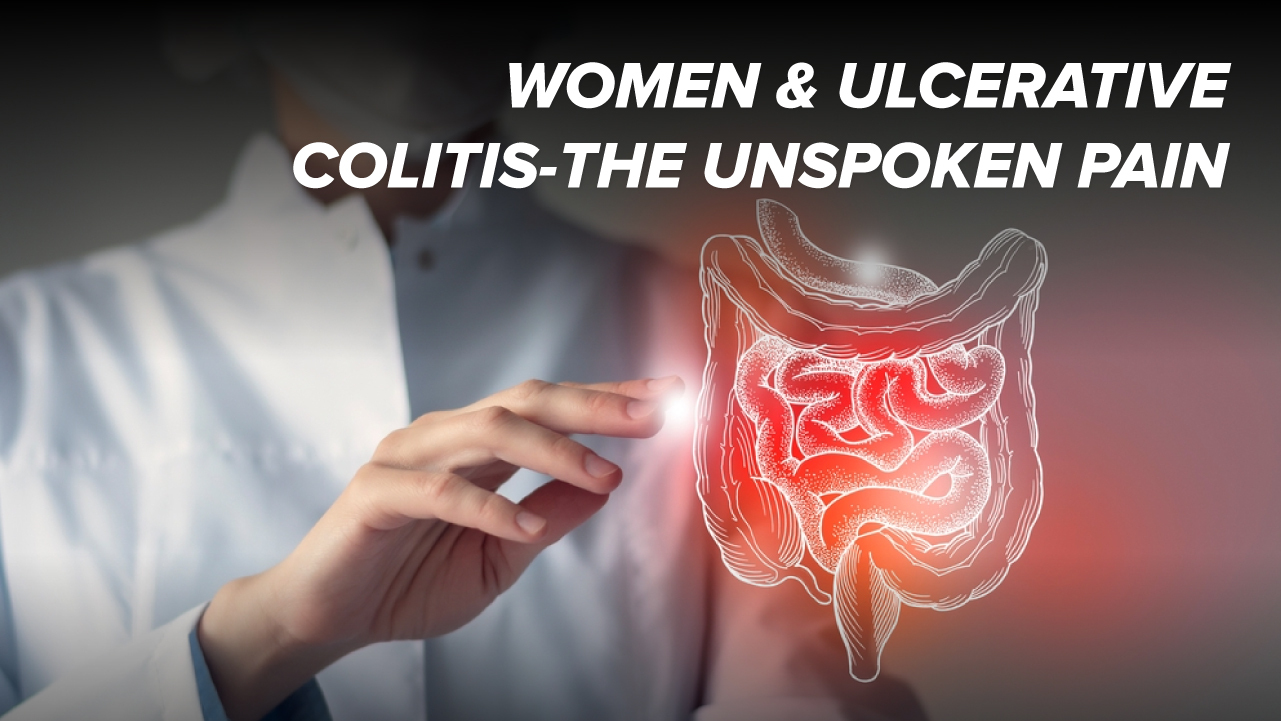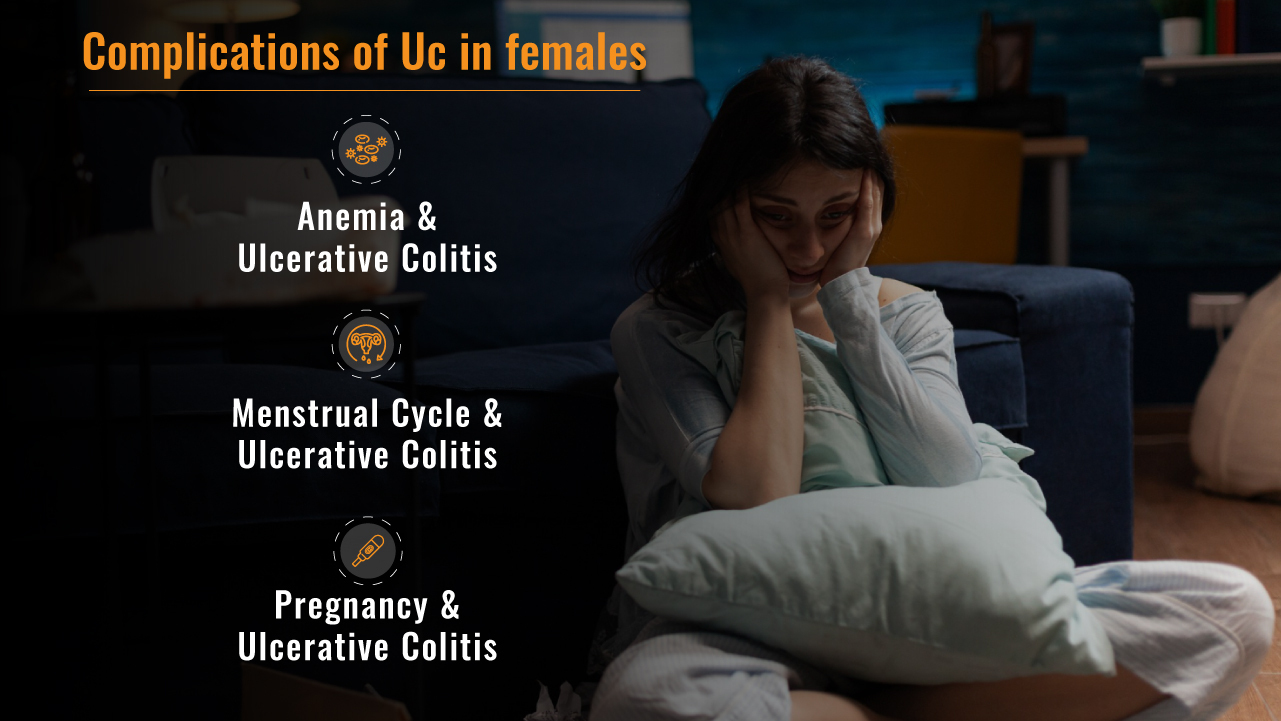
What is UC?
Ulcerative Colitis in a simple language is an inflammatory bowel disease that can cause inflammation in the intestine linings. The common symptoms include abdominal pain, cramping, diarrhoea and blood in stools.
How does UC in men & women differ?
Inflammatory Bowel Disease (IBD) affects differently based on the gender of the patient. Even though it sounds unfair, it is true.
The symptoms remain the same among both men and women, the latter have to face a few additional challenges with the disease. The major challenges include anaemia, change in the menstrual cycle, sexual pain, pregnancy complications. The reason for this high intense pain when compared to males is due to the shorter distance between the digestion and reproduction system.
In this article, we are going to discuss the various complications of ulcerative colitis in women and how to overcome them with a natural and healthy lifestyle.

Complications Of UC in Females
1. Anemia & Ulcerative Colitis
Anemia is when there are not many healthy red blood cells in the body. Red blood cells carry oxygen to the organs. There are different types of anemia but the most common is iron-deficiency anemia. Women with UC are at risk of anemia. The most common symptom known is feeling tired. Other symptoms include dizziness, headache, cold limbs, pale skin, or shortness of breath.
The major cause of anaemia is a lack of iron. With IBD, irritation and inflammation in the intestines can interfere with the body’s ability to absorb iron properly. Alongside, the other causes include intestinal bleeding, poor absorption of vitamins & minerals, and lack of folic acid.
2. Menstrual Cycle & Ulcerative Colitis
Women with UC, experience changes in their menstrual cycle and start to experience irregular periods or changes in their flow. The prostaglandins that cause uterine contractions and other menstrual symptoms also cause colon contraction, which in turn make the period pain more intense.
When women with UC menstruate they face an increased risk for anemia. The anemia risk is high for women with high flow. Losing a lot of blood during the flow can use up more red blood cells than the body can produce, thus reducing iron stores.
3. Pregnancy & Ulcerative Colitis
Young women with UC do have worries about their fertility as well as whether the heritability can be passed to their unborn child. Experiencing a flare-up during pregnancy is the most concerning factor for women with ulcerative colitis. Flare-ups are also likely to occur in the first trimester or immediately post-delivery. However, the rate of women passing UC to babies is quite low.

Things to remember for women with Ulcerative Colitis
1. Periods can irk
According to a study published in Inflammatory Bowel Diseases, Volume 24, more than half of the studied women sample have agreed that the symptoms worsen during their menstrual period. Increased frequency of bowel movement, gas or bloating, and increased abdominal pain are the most common symptoms.
These symptoms are also said to be caused by hormonal changes. Women produce prostaglandins- a hormone-like compound that can also cause increased contractions of the smooth colon muscles. This results in gastrointestinal problems like diarrhoea and cramps.
2. High risk for sexual dysfunction
Women with IBD do experience sexual dysfunction either in form of pain during sex or lack of sexual desire. Everything in the pelvis is interconnected, and this is why when one organ system isn’t functioning, it can affect them all. Women also experience pelvic floor spasms, which tighten and make intercourse difficult.
Considering different sexual positions and focusing on physical intimacy other than traditional intercourse might help to ease the pain.
3. Plan your family goals
Ulcerative Colitis usually doesn’t affect the chances of getting pregnant. But many women have fewer children due to the fear that the disease could be passed on the child. Even though UC doesn’t interfere in the pregnancy, it is important to plan it carefully. It is because, if a woman conceives during a flare, there’s a high chance that the symptoms could worsen throughout the pregnancy.
4. Child may or may not be at risk
The chances of IBD passed on to the child is even less than 10%. However, the risk increases if the partner also has IBD. The inheritance of Ulcerative Colitis isn’t fully proven, as there are many other genetic and environmental factors.
Final Words
Ulcerative Colitis is slightly more common in females than in males. When one has ulcerative colitis, it is not always easy to know what food fuels the body. Nutrition affects the overall well-being along with the IBD symptoms. With High Carb Health, you can get guidance for a well-balanced and nutrient-rich healthy diet. Without proper nutrients, the symptoms are more likely to turn into serious complications like nutrient deficiencies, weight loss, or malnutrition.
FAQ
- Will my baby inherit Ulcerative Colitis?
The inheritance of Ulcerative Colitis is unknown, as many other genetic and environmental factors are also involved. Even though the inheritance is unclear, it can increase the risk of developing the conditions.
- Can Ulcerative Colitis get worse during pregnancy?
Many women with ulcerative colitis get conceived during the flare-ups, the colitis can get worse during pregnancy. In some cases, it might be active and remain stable or go back into remission.
